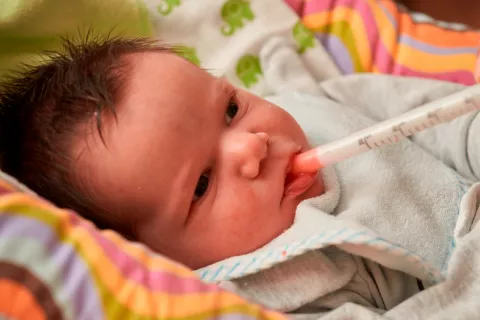
Antibiotics are used to treat between 4% and 10% of newborns with suspected infections. However, a study from the University of Edinburgh (Scotland) has found evidence indicating that this type of drug in the first week of life could reduce your intestinal microbiome, which are the good bacteria that help to properly digest breast milk and strengthen the immune system.
And it is that, according to the authors of the work published in the journal Nature Communications, broad-spectrum antibiotics – those that are aimed at treating a wide range of bacteria – are prescribed in most cases unnecessarily, since they are very few actually end up with an infection that requires this treatment.
Research warning of the risks of antibiotic use in children this young looked at 147 infants with suspected sepsis – a sudden immune response to infection – who received one of three standard antibiotics and compared the results of 80 infants without suspected infection and who did not receive these drugs.
Increase in disease-causing bacteria
Findings from studying rectal and faecal samples before and after treatment and at 1, 4 and 12 months of age indicated that those who had been treated with antibiotics had lower levels of different Bifidobacterium species than those who had not. type of treatment.
“We were surprised by the magnitude and duration of the effects of broad-spectrum antibiotics on the microbiome of infants compared to the effects of those same antibiotics on the microbiota of adults. This is likely because the antibiotic treatment is given at a time when babies have just received their first microbes from their mother and have not yet developed a resistant microbiome.”
Of the antibiotics tested, the combination of penicillin and gentamicin had the least deleterious effect on the neonatal gut microbiome.
The authors also observed an increase in potentially disease-causing bacteria and in the number and abundance of genes that were associated with antimicrobial resistance in the group that received antibiotics. Of the three types of antibiotics tested, the combination of penicillin and gentamicin had the least detrimental effect on the infants’ gut microbiome and the number of antimicrobial resistance genes that show up.
Therefore, they recommend that in case of suspected infections in newborns, this combination of antibiotics be chosen, in this way the risks of babies depleting their intestinal microbiome, a fundamental part of health at any age, would be considerably reduced.
“It is particularly concerning that after antibiotic therapy in newborns we have observed a sharp increase in Klebsiella and Enterococcus species, which are important multidrug-resistant pathogens. This underscores the importance of further studies to balance the need for and efficacy of these antibiotics against the risk of emergence of resistance-related genes. There may also be scope to develop new interventions, such as live biotherapeutics, a treatment produced by living cells or involving, to effectively restore the composition of the baby’s gut microbiome after antibiotic therapy,” concludes Willem van Schaik, another of the researchers.
.